Champions of Change Blog
“Hidden Wounds Of War.”
Posted by on March 21, 2013 at 3:27 PM EST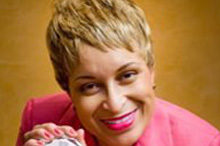 Marylyn Harris is being honored as a Champion of Change for her efforts as a woman veteran.
Marylyn Harris is being honored as a Champion of Change for her efforts as a woman veteran.
For over ten years, I never told my story. I rarely mentioned the fact that I was in the military or that I was a combat veteran. Like many women Veterans, I kept this information tightly guarded and believed that the memories of my military service were safely in the past, locked away in my mental vault.
Almost two years ago, I was asked to share my story for a National VA Campaign called “Make the Connection.” I was told that my story of resilience, healing, and transformation could serve to inspire other Veterans healing from military-related traumas such as post-traumatic stress disorder, military sexual trauma and physical illnesses. I was asked to share some of the resources I utilized to heal. I highlighted the role of the Vet Center in my healing and the role of Entrepreneurship in my personal transformation.
In 2009, I had a burning desire to help Veterans and Military Families. I did not want another Veteran denied optimal quality of life because they had “hidden wounds of war.” I sought out to locate other like-minded individuals and organizations that understood that some Veterans have challenges working in traditional employment settings after being exposed to war. I joined numerous Veterans Service Organizations (VSOs) and actively worked within them to raise the level of awareness about disturbing trends I identified in women veterans like me. This population has many unmet needs, such as high unemployment, growing homelessness, unprecedented suicide rates, high divorce rates, child custody issues, dishonorable military discharges and chronic hopelessness. The Center for Women Veterans reported in 2010 that there are over 1.8 million Women Veterans in the United States. California, Texas, and Florida have the largest populations of Women Veterans and consequently, some of the biggest unmet needs.
Since I live in Houston, a city with over 30,000 women veterans, I decided to pick one variable that I could impact positively and work hard to fix it. I formed a team and began to host free networking events for veterans, military family members, and Veteran Service Providers. I inquired about the immediate needs of this population. It was very obvious to me that male veterans are able to socialize with each other and get their needs met. Male Veterans continue the camaraderie they get used to in the military. However, only a small percentage of women veterans are involved in veterans’ organizations, few women veterans continue to communicate with other women veterans after discharge, and women veterans rarely self-identify as a Veteran. Even fewer pursue business ventures.
I decided to be a “change agent” and committed to educating and empowering Women Veterans to start and grow businesses. After doing a year of “market research,” it was glaringly obvious to me that a huge unmet need existed in Houston and throughout the country to mobilize this “economic sleeping giant” of Women Veterans.
Next, I sought out programs that educate and support Veterans to start businesses. These were scarce at the time. In 2010, I located and attended the Entrepreneurship Bootcamp for Veterans with Disabilities (EBV) at Florida State University (FSU). EBV changed my life! EBV is a collaboration between the U.S. Small Business Administration and Syracuse University's Institute for Veterans and Military Families. In my EBV Class, there were twenty-one Veteran Entrepreneurs in the Program. Twenty male veterans and me.
After graduating from EBV, I had a “community of support” and a “supplier network” in the other EBV graduates, faculty, and supporters from around the country. After so many years, I finally felt supported! I was again connected with the Military Community, a source of strength. Five months after graduating from EBV, with my children committed to help, we self-funded and launched the country's first Women Veterans Business Center in a two-day Grand Opening Event. Day One focused on building alliances with Community Partners (SBA, SBDC, SCORE, local politicians, Veteran, State and Federal and private entities). On Day Two, we hosted our first Women Veterans Business Bootcamp at Houston City Hall in the Mayors Boardroom.
The Inaugural Event was a huge success and we currently host quarterly Women Veterans Business Bootcamps focusing on Financing Your Business and Business Resources and Opportunities. In 2011, we held our first Anniversary Celebration where we hosted an Entrepreneurial Challenge for Military Youth, and awarded a Woman Veteran Business of the Year Award and a Military Friendly Company of the Year Award. The response to our Programs has been huge.
As a result of my personal Entrepreneurial transformation and Community Partnerships, I now travel nationally with the Institute for Veterans and Military Families’ program Veteran-Women Igniting the Spirit of Entrepreneurship Conference (V-WISE) as the National V-WISE Ambassador! I exhibit and give presentations at local and regional events, and also was able to present at the National Veterans Small Business Conference. I have written a Resource Guide Series for Texas Veterans called, 25 FREE Resources Every Texas Veteran Needs to Know. I also received a National Appointment and serve on the federally chartered Advisory Committee on Veterans Business Affairs (Public Law 106-50). I believe I am “passionately purposed” to do this work.
Last year, the Women Veterans Business Center partnered with the Kaufman Foundation and trained and launched 26 new Houston Veteran Owned Businesses utilizing the Kauffman “FastTrac New Venture” Program. In late March, the Women Veterans Business Center will achieve another milestone. Houston is a city without a military base. No source exists to communicate information to the thriving Houston Military Community. The Center will begin hosting free monthly Veteran Owned Business Information Sessions on the last Tuesday morning of every month. Now active Service Members, Veterans, and Military Families in Houston will have a central place to get accurate information and referrals on starting a Veteran Owned Business.
I am honored to continue my “Service to America” by educating and empowering Women Veteran Owned Businesses to start, grow, heal, and improve the quality of their lives and communities across the US...that's what I do.
Thank you to the White House for this honor.
Marylyn Harris founded the nation’s first and only Women Veterans Business Center (WVBC) in Houston, Texas.
Learn more aboutSisterhood, Service, and Sacrifice
Posted by on March 21, 2013 at 2:44 PM EST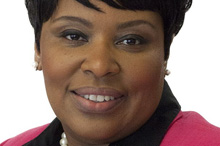 Ginger Miller is being honored as a Champion of Change for her efforts as a woman veteran.
Ginger Miller is being honored as a Champion of Change for her efforts as a woman veteran.
In the early 90's after a medical discharge from the Navy, I became homeless, along with my husband who is a disabled veteran and our young son. The sad part is, I didn’t know I was homeless; I thought I was simply surviving. To make ends meet, I worked three jobs while going to school full time. This was a time in my life that I isolated myself from my peers. I was ashamed to ask for help because, honestly, I did not know help was available, and the sense of pride I felt while in the military was diminished.
After suffering in silence for more than a decade due to my husband's untreated Post-Traumatic Stress Disorder, I finally spoke up by creating John 14:2, Inc, a non-profit organization dedicated to supporting homeless and at risk veterans. My thoughts were that, if it happened to me, there have to be thousands more just like me who are suffering in silence, homeless or at risk of becoming homeless.
Two years after the inception of John 14:2, I felt like there was something missing. I got up at three o'clock one morning and looked in the mirror. The person I saw was Ginger Miller, Woman Veteran; Ginger Miller, Former Homeless Veteran; Ginger Miller, Disabled Veteran. Then a light went on. It became crystal clear to me that I needed to do something specifically for women veterans, and I did just that.
As a woman veteran, I recognize the call to sisterhood, service, and sacrifice and this is why I started Women Veterans Interactive (WVI), which meets Women Veterans at their points of need. WVI is an organization for women veterans by women veterans, willing to roll our sleeves up to assist our sister veterans, ensuring that we never leave one behind. If a women veteran is homeless, in need of a mentor or support services, or looking for a great way to get involved in community outreach, we can meet those needs. We support women veterans through Advocacy, Empowerment, Interaction, Outreach, and Unification (AEIOU), with Outreach being my biggest priority for the organization.
Women Veterans Interactive (WVI) has programs and events designed specifically for woman veterans, including our Empowerment and Unification Lunch Cruises that give women the opportunity to have peer-to-peer interaction, food, and fun while enjoying nautical views. Most importantly, these cruises are a time for them to find out about the services and benefits available to them in an effort to break down the barriers that lead to homelessness. Our first year, we had over 600 woman veterans participate and held the event in both Maryland and New York. Other programs we hold include our Women Veterans Financial Literacy Program and our Women Veterans Breakfast Series. Topics for the breakfast series are include “The Great Transition and Benefits,” “Homelessness,” “Education and Employment,” and “Mentorship.” In addition WVI provides Turkey Baskets, Christmas Toys, winter coats, referrals for housing and employment, and rental assistance.
To see the look and feel the appreciation and relief flowing from a woman veteran’s heart when she comes to pick up food to feed her children for Thanksgiving, or to hear a woman veteran say, “Thank you Ms. Ginger, now me and my babies can have Thanksgiving Dinner,” is simply priceless.
Recently, there was a woman veteran who came to pick up food for Thanksgiving who looked familiar to me. I realized that this was one of the women who lived in a transitional facility that WVI went to visit. This particular woman had moved into permanent housing during the Thanksgiving Holiday, and we provided her with Thanksgiving Dinner for her and her son, whom she just regained custody of.
As a compassionate servant and leader, I am fortunate to have the opportunity to serve at various state and county levels on the Maryland Commission for Women, the Maryland Caregivers Support Coordinating Council, the Maryland Veterans Resilience Initiative, and as Chairwoman of the Prince George’s County Veterans Commission.
When people ask what drives me, I just simply say I remember feeling lonely, depressed, scared, and ashamed, and I remember being homeless and not having enough food to eat. I remember the transition, the struggle…I remember being these women.
Ginger Miller is the Founder and CEO of Women Veterans Interactive.
Learn more aboutWe Started With A Dream
Posted by on March 21, 2013 at 2:27 PM EST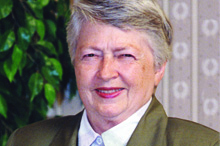 Wilma Vaught is being honored as a Champion of Change for her efforts as a woman veteran.
Wilma Vaught is being honored as a Champion of Change for her efforts as a woman veteran.
I’ve been associated with the Women In Military Service For America Memorial Foundation in some capacity since 1987: first as a board member and then, starting in March of 1987, as the president. We started with a dream: to build a Memorial in the Nation’s capital to honor the contributions of the 2.5 million women who have served in the nation’s defense. In 1997, we changed the face of monumental Washington with the dedication of the Women’s Memorial and its 33,000 square foot education center at the gateway to Arlington National Cemetery.
Today, the service of some 252,000 women, past and present, has been registered with the Memorial, preserving their stories of patriotism, valor, and service for future generations of Americans to see. We add more stories every day, and will continue this effort until every possible woman who has served takes her rightful place in history at the Women’s Memorial. Some 150,000 visitors annually have accessed these stories, paying tribute to a mother, daughter, sister, aunt or friend, and learned about the contributions of individual women. It is especially gratifying to know that we have created a place (to our knowledge, the only place) for women’s stories to be told and for people to learn about these extraordinary women who live and work amongst us.
The Memorial’s exhibit gallery is the place where we tell the collective story of women’s service. A variety of permanent and temporary exhibits chronicle the history, beginning with the American Revolution through to today’s women serving in Afghanistan and around the world. In early March, a new special exhibit was added celebrating 40 years of women in the Chaplains’ Corps, an amazing story of ministry to our military members and their families and spiritual guidance to the nation’s military leaders. I’m so proud of these efforts! Where else would the average citizen and our young people learn about these women and what they have accomplished? How would they know about our women prisoners of war, or female military astronauts and code breakers, and the courage of young African-American women soldiers during World War II? The list goes on and on, and extends well beyond the Memorial and Foundation. Our collaboration with journalists, authors, film makers, researchers, and artists has resulted in scores of books, documentaries, magazine and newspaper articles, and a variety of art exhibitions across the country. I think we have played a significant role in shaping and building the rich legacy of women’s service to the nation.
Our education efforts are another source of enormous pride. The Foundation is the home to a world-class collection of artifacts and memorabilia related to women’s service, likely the largest in the world. Our Oral History collection continues to grow and includes the oral histories of women from World War I to the present. Scholars, researchers, and journalists consistently use both of these collections, along with our small research library. We established a small publishing firm, Military Women’s Press, which publishes an annual calendar, posters and to date, three books, one of which is the only publication to focus on the service of women during the Korean War era. Our gift shop specializes in books by and about military women and memorabilia related to women’s service. We host a variety of seminars and activities that speak to women’s service, including our annual Memorial and Veterans Day programs. Students have used our educational materials across the nation and we have hosted education programs for young girls at the Memorial. The availability of resources is the only limitation.
Looking back, I can say with confidence that we have made a place for military women in our history books, adding a new chapter to America’s military history. We have not only changed the face of monumental Washington, but also added a new face to the image of America’s servicemembers and veterans. The Women In Military Service For America Memorial and Foundation have truly been Champions for Change.
The Women In Military Service For America Memorial Foundation is always looking for eligible women, so if anyone reading this knows of a servicewoman, living or deceased, help her take her rightful place in history. Visit our website at www.womensmemorial.org to access a registration form or contact us at 800-222-2294/703-533-1155 or hq@womensmemorial.org to find out if a woman is registered.
Wilma Vaught is the President of the Women In Military Service For America Memorial Foundation.
Learn more about“I'm Not Dead Yet.”
Posted by on March 21, 2013 at 1:52 PM EST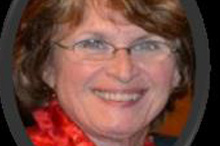 Marsha Four is being honored as a Champion of Change for her efforts as a woman veteran.
Marsha Four is being honored as a Champion of Change for her efforts as a woman veteran.
In looking back, it is much easier now to realize that my decision to enter the military changed my life forever. As a woman Veteran who served her country as an Army nurse in Vietnam (1969), I saw the best and the worse of humanity. The sixties and seventies were hard times; times of great unrest, times of civil upheavals, times of change, times of questioning...questioning who we were, what we stood for, and what we would accept. Brought to this unrest was the anti-war movement, the civil rights movement, the women's rights movement, and the list goes on. It was in this atmosphere that I reentered the “real world” from the world of war. This period in the history of our country and my military service changed me forever. It was in this time that I became the woman that I am today.
Upon my immediate return I extricated myself from all the emotional pain of war by taking a five month hiatus from life. I hit the road in a VW van with a man I met in Vietnam and later married. I recognize it now as running away; I like to think of it as getting my head together. During the ensuing years, I didn't think of myself as a Veteran. It never entered my mind. Happenstance brought me to meet another Vietnam nurse, Grace. It was she who brought me into the world of “Veteran,” and who helped me to embrace it with pride.
Until then, I didn't realize I had been searching all those years for an unknown reason for my life, but it was then that I opened myself and discovered who I was: I was now a member of an elite group of men and women, ones with whom I would stand forever. I educated myself in all that being a Veteran meant, which led me to discover that, while we all earned benefits, they were not always equal or equitable. Many Veterans were homeless, without jobs, seeking better health care. I began to align myself with many other women Veterans of my era who were fighting the good fight and pushing the envelope on the inequality of our VA benefits; women like Lynda, Lily, Mary, Sara, Joan and Linda. And so it began for me.
All of this led me to the Vietnam Veterans of America (VVA), initially joining a local chapter and eventually moving to its national office, where I was a part of a team working to ensure that the voices of Veterans were heard. I was able to contribute, write, and deliver Congressional testimony, receive a VA Secretarial appointment to the Advisory Committee on Women Veterans, and embrace the unacceptable situation of Veterans living on the streets and in shelters. If I was able to make a change then, it was my responsibility to do so. This lead me to the organization of a homeless Veterans initiative called Stand Down. Its creation loomed as an insurmountable task: to organize the local VA, the City of Philadelphia and its social service agencies in an effort to coordinate their services over a three day week end in a military camp setting. But it happened and it continues. I believe this effort played a major role in strengthening the foundation of the highly integrated system that now exists for homeless Veterans in Philadelphia today.
At this point I left hospital nursing to perform nursing on a different plain with The Philadelphia Veterans Multi-Service & Education Center, a non-profit agency. I remained with the agency until my recent retirement as its Executive Director, after seventeen years of working with Veterans who sought assistance; some for direction, some for care, some for dignity, some for hope. There have been many challenges and many accomplishments along the way, but I am grateful for every day of the experience. These past twenty-six years of my life have been an extraordinary journey and a blessed gift to me, never to have been discovered if not for that defining oath I made forty-five years ago in an Army recruiting office in Indianapolis.
I intend to continue my advocacy because as they say, “I'm not dead yet.”
Marsha Four sits on the National Board of Directors of Vietnam Veterans of America (VVA), and is the Chair of its National Women Veterans Committee
Learn more aboutFacing into the Truth
Posted by on March 21, 2013 at 1:22 PM EST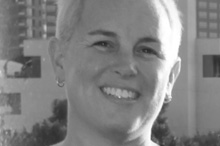 Becky Kanis is being honored as a Champion of Change for her efforts as a woman veteran.
Becky Kanis is being honored as a Champion of Change for her efforts as a woman veteran.
One of the most difficult decisions I ever made was to resign my commission from the United States Army. After graduating from West Point and serving for nine years, I reached a point where I was unwilling to deceive my colleagues about my sexual orientation for another day. This was well before President Obama had been elected or signed the law ending “Don’t Ask, Don’t Tell.” At the time, the Army had posters about its values hanging in almost every hallway. My own former First Sergeant was featured on an Army poster about integrity, a value that depends on facing into the truth and being honest with yourself and others. I shared that value with the military, and eventually, my commitment to integrity left me with no ethical choice but to resign— a choice I made with anger and sadness.
Eight years after I left the Army, I was asked to be the founding board chair of Knights Out, a group of LGBT West Point alumni committed to being honest about who they were and who they loved. I remember my response vividly: “only if we’re really going to do something about Don’t Ask, Don’t Tell – I don’t want to lead a social club!” Thankfully, my fellow West Point grads were serious about making change; the time had come for the military and all of us to live up to the integrity we professed to value. I still remember our first meeting, in which Lieutenant Dan Choi offered to be our public spokesperson in spite of warnings that it might cost him his commission (It eventually did). I also remember asking my dear old friend, Sue Fulton, to join our board. Sue went on to become the first openly gay woman appointed (by President Obama) to the Board of Trustees at West Point and the first LGBT person to be married in the school’s Cadet Chapel. Together, we and other advocates claimed a front row seat to the demise of Don’t Ask Don’t Tell because we were willing to face into the truth and be honest about who we were and what we believed.
After resigning my commission from the Army, I eventually found my way to Rosanne Haggerty, a brilliant pioneer who has now been my boss, mentor, and friend for over ten years. Rosanne challenged me to join her team and lead an effort to reduce street homelessness in Times Square by two-thirds in three years. Together, we faced the hard truth that existing approaches to ending homelessness weren’t working. To make a real impact, we would have to be willing to abandon age-old assumptions and start from scratch. Over four years, we built a brand new street outreach model that brought street homelessness in the area down by nearly ninety percent and forever changed the way New York City responds to homelessness.
Fast forward to 2013. Today, our original work in Times Square has become the blueprint for the 100,000 Homes Campaign, a national movement of 189 communities across the country working together to permanently house 100,000 of the most vulnerable homeless people in America by July 2014. I am privileged to direct this nationwide effort, which has already seen participating communities find permanent homes for 37,000 people, including over 13,000 veterans. My team and I have built the Campaign around a shared commitment to facing into the truth, however challenging it may feel at times. We have gathered and analyzed reams of data to help communities track their progress and improve their housing systems. We have helped volunteers survey more than 42,000 homeless Americans to figure out exactly who is sleeping on the streets in their communities – by name and photograph – and what it will take to get each of them into housing. We are resolute in our belief that complex social problems demand a sometimes frightening degree of honesty: difficult facts must be faced head on and traditional assumptions must be subjected to scrutiny and possible reinvention.
Today, despite the nearly ubiquitous rhetoric on “ending homelessness,” only 28 communities in the US are actually on track to meet the federal goal of ending chronic homelessness by 2015. Even so, I am confident that this goal remains soundly within reach. My team and I are scrambling to figure out what the most successful communities are doing that others can replicate, but meanwhile, integrity demands that we acknowledge the long distance we have to travel and work doubly hard to catalyze major change in communities across the country. As we do so, we are guided by a process that we’ve adopted from the Hendricks Institute for facing into the hard truths we may encounter: F.A.C.T., which stands for Face, Accept, Choose, and Take Action. First, Face into whatever it is that you’re not facing. What are the hard realities you’re avoiding or the difficult facts you’d rather not see? Next, Accept. What is it that you have resisted or refused to accept about these truths? Then, Choose. What are you really aiming for, and what outcome do you actually want? And finally, Take action. In light of the truths you faced in step 1, identify one small, pleasurable step you can take toward your clarified goals.
Facing into the truth is the key to social change and a regular habit of every successful problem solving effort. My wife and I believe this so passionately that we recently formed an organization called the Social Change Agency to help non-profit leaders adopt it. A better world is well within our grasp, and facing into the truth will help us get there if we are willing to do so.
Becky Kanis is the Director of the 100,000 Homes Campaign for Community Solutions and a co-founder of The Social Change Agency.
Learn more aboutSustainability Essential for National Security and World Peace
Posted by on March 21, 2013 at 12:20 PM EST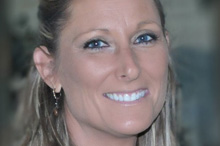 Sharie Derrickson is being honored as a Champion of Change for her efforts as a woman veteran.
Sharie Derrickson is being honored as a Champion of Change for her efforts as a woman veteran.
I am so very honored to have been selected as a White House Champion of Change with these truly magnificent women who served in uniform and who continue to serve today. I am still not certain what I did to warrant such an honor, but feel blessed that I might have a vehicle in this blog to help enlighten others on the utmost importance of world-wide sustainability. As a Navy and combat journalist, I was able to travel across the world and experience different cultures and witness the human condition on various fronts. These travels were my first experiences that helped me understand the importance of sustainability to not only to the planet’s health, but to economic security, cultural identity preservation, and, yes, world peace.
Many people do not understand what sustainability is. When I left the military, I remained a journalist and had the pleasure to interview many who were working in the “Green” sector. Back then, it was somewhat of a new concept. Then came the term “Sustainability,” a more holistic approach: everything has to remain in balance. Economies cannot grow unless we take care of the environments that provide those resources, and the cultures that depend on those resources.
However, humans are reaping more than they can sow right now. We consume more than we can provide. Most of us have become slaves to the grid and would be crippled economically without power and clean drinking water. Besides food and shelter, communities must have clean drinking water, and available and affordable power to grow and prosper on the world stage. But there is more to it than that. Keeping the world – its people and their resources – balanced is vital not only for a healthy planet, but for our national security and the security of all people across the globe. I came to this conclusion in the military. My experiences at the Stars and Stripes newspaper and Combat Camera introduced me to many cultures, from the booming economy and technological wonderland of Tokyo, Japan to some of the hungriest and poor on the planet in Somalia. That is when it really hit me.
Our job in Operation Restore Hope was to help ensure peace in Somalia while food was being distributed to a culture that had been shattered after years of civil war. As a result of the war, the economy and the country’s infrastructure were devastated. At one time, Somalia was a relatively stable nation with a growing economy. Women were free and were highly educated. Somalia was a religiously moderate nation, and Islamic fundamentalism was a foreign concept. Not so now. For many years, education was not available to anyone and the beautiful capital of Mogadishu, along with the rest of the country, was reduced to rubble. There was no food, clean drinking water, or electricity. Somalia had gone from an African gem to a cesspool and it has not improved much since I left there, a fact that saddens me as I grew to love the country and its people while working there.
I realized when I was in Somalia that, until the infrastructure was rebuilt, these people had a poor chance of having a good and decent life. Once the country was destabilized, even basic needs became an elusive shadow, and radical Islam and terrorist organizations moved in. Most people knew it was too late, and left their own country for a future elsewhere as refugees. This is a repeated scenario around the world. Once a country loses its own ability to sustain itself with the basics for whatever reason, the country dissolves or turns into either a world-wide burden or a world-wide security threat. I love the idea of having a “Green Planet,” but what I love also is the idea of having a “Safe Planet” where children are free to grow up, be educated, and make the world a better place. But without the basic essentials of food, clean drinking water, and available, affordable, and reliable power, whether it be conventional or renewable, no society has a chance to thrive with longevity.
Sustainability is one of the fastest growing businesses in the world and I am proud to work in it and educate others about it. It is a business where the saying “It’s not personal, it’s just business” does not apply. It is personal for me. The children of Somalia, Haiti, Japan, and the United States, and my own daughter and granddaughter, will not have a stable world unless we sow more than we reap and establish balance, which, in turn, may lead to peace. Just as when I was in the military, peace is still the final objective.
Sharie Derrickson is Vice President of New Wind, LLC in Nashville, TN, a sustainable energy company.
Learn more about
- &lsaquo previous
- …
- 77
- 78
- 79
- 80
- 81
- 82
- 83
- 84
- 85
- …
- next &rsaquo
White House Blogs
- The White House Blog
- Middle Class Task Force
- Council of Economic Advisers
- Council on Environmental Quality
- Council on Women and Girls
- Office of Intergovernmental Affairs
- Office of Management and Budget
- Office of Public Engagement
- Office of Science & Tech Policy
- Office of Urban Affairs
- Open Government
- Faith and Neighborhood Partnerships
- Social Innovation and Civic Participation
- US Trade Representative
- Office National Drug Control Policy
categories
- AIDS Policy
- Alaska
- Blueprint for an America Built to Last
- Budget
- Civil Rights
- Defense
- Disabilities
- Economy
- Education
- Energy and Environment
- Equal Pay
- Ethics
- Faith Based
- Fiscal Responsibility
- Foreign Policy
- Grab Bag
- Health Care
- Homeland Security
- Immigration
- Innovation Fellows
- Inside the White House
- Middle Class Security
- Open Government
- Poverty
- Rural
- Seniors and Social Security
- Service
- Social Innovation
- State of the Union
- Taxes
- Technology
- Urban Policy
- Veterans
- Violence Prevention
- White House Internships
- Women
- Working Families
- Additional Issues

